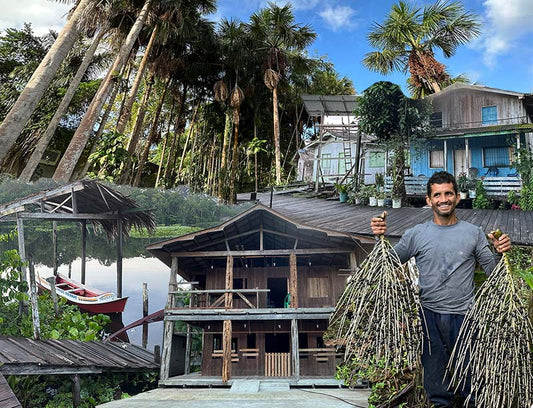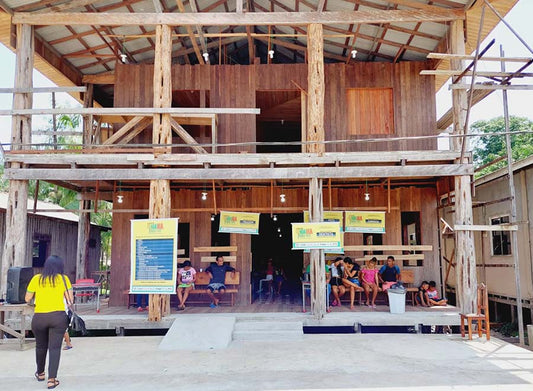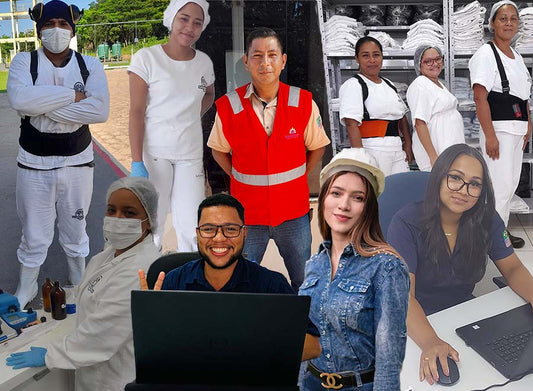We have some exciting updates on our Packaging Eco-mmitment.
SAMBAZON is committed to achieving plant-based and post-consumer recycled packaging for all USA retail products by 2025.
Read on to learn where we started, where we are today, where we are going, and how we'll get there as we reduce our environmental impact with our packaging footprint.
WHERE WE STARTED
SAMBAZON is founded on a triple bottom line business philosophy. This means that we consider people, the planet, and prosperity in all of our business decisions. Our Açaí is wild harvested, fair trade certified, and organic. Our packaging also needed to be made with these social and environmental considerations in mind. We started the journey of reducing our packaging footprint to contribute to the rising wave of eco-conscious action to combat plastic waste. Transparency is important to everyone who cares about their impact on the environment. That’s why we decided to create our eco-mmitment to give ourselves an objective to work toward: reducing and eliminating our packaging footprint on the environment.
In 2019, 18% of our USA retail products* were in post-consumer recycled or plant-based packaging. 82% of our packaging was made from virgin plastic that was highly unlikely to be recycled.
This virgin plastic was derived from fossil fuels, created without any recycled materials. Post-consumer recycled material is made from items that consumers recycle every day, such as plastic bottles, aluminum, paper, and cardboard boxes. Plant-based packaging is made from renewable biological sources to form material. Read more about plastic recycling rates and other plastics information here.
Once we identified that 82% of our products were in virgin plastic, we set an aggressive goal to improve our packaging. Our goal is to have all of our USA retail products in plant-based or PCR packaging by 2025.

WHERE WE ARE AT TODAY
By the end of the calendar year 2021, 64% of our USA retail packaging was in post-consumer recycled or plant-based. That is a BIG 46% improvement from 2019. An additional bonus of the changes made to our packaging avoided over 360 metric tons of virgin plastic in 2021! This would be equivalent to 72 African Elephants.

Where did these changes come from over those two years? Since 2019, we transitioned our Sorbet pints from plastic to paper, reducing plastic by about 90%.

We launched the plant-based Ready to Eat-Bowls with a container made from 100% Plant Fiber.

We also transitioned our Fresh Juices into 100% post-consumer recycled bottles.

All of our retail products ship in corrugate cases. We are averaging 35% post-consumer recycled and 5% post-industrial recycled content. We are working with our suppliers to increase recycled content while maintaining the integrity of the case. We also work with our suppliers to ensure the material is certified from responsibly managed forests, through the Forest Stewardship Council or the Sustainable Forestry Initiative.
WHERE WE ARE GOING
Our goals are to reduce our packaging footprint where we can. We want to innovate into less packaging and reduce the weight of existing materials or remove material altogether. Then, we aim to use either sustainably managed renewable resources or post-consumer recycled materials at the start of life. We aim for either certified industrial compostable to potentially capture food waste or have a ‘good’ chance of getting recycled at the end of life. ‘Good’ is yet to be determined as we need to not just rely on using the recyclable claims allowed per the Federal Trade Commission. Instead, we want to make sure there is actually an end market for recycling each packaging item that we use.
This is in addition to all of the other key requirements such as food safety, reducing food waste, and protecting the product.
HOW WE'LL GET THERE
Today, over 30% of our USA retail packaging is in ‘Flexible Film’. Flexible Film is packaging like our Superfruit Packs, Bags, and Bites wrappers. We are currently using the most efficient, lightweight, lowest emissions packaging for these products. The packaging allows us to reduce food waste by keeping the food safe for a long time. However, these flexible films are still not recyclable and are not yet designed to break down in a natural environment.
In 2018, we joined the OneStepCloser Packaging Collaborative (OSC) with the goal to remove petroleum-based plastics from landfills, oceans, and our planet. One of the Packaging Collaborative’s key initiatives is to help brands transition into compostable Flexible Films. Through this collaborative network, we are pioneering, testing, and trialing viable plant-based alternatives for that remaining 30% of Frozen flexible films.
Our Eco-mmitment is focused on the start of life, which is where the material comes from and how it is produced. To address the end of life, through OSC, we engage with collaborative groups and organizations working on testing and scaling solutions as well as staying updated with policy changes.
We, and our partners at the One Step Closer Packaging Collaborative, believe that the best way to address this significant challenge is to create an open, collaborative environment. Nearly every company is trying to accomplish a similar goal, and by working together on this initiative, we have the chance to drive an industry shift toward a planet-friendly approach.

WORKING TOGETHER TOWARDS A SOLUTION
We are proud to be a part of One Step Closer, and spearhead change that addresses the toughest sustainability problems facing our industry and our planet. Our intention is to be transparent about the efforts we are making and the progress that accompanies those efforts. If you’d like to get more involved, check out information on how to join the campaign here.
*Does not include Food Service or International products.







Comments
(0 Comments)Please note, comments need to be approved before they are published.